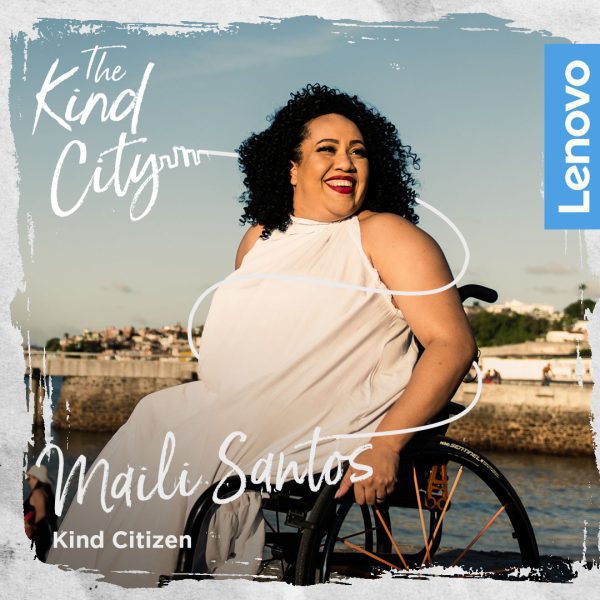Maili Santos, Makeup Artist and Digital Creator
Salvador, Brazil

38 years ago my life crossed paths with that of a strong woman who struggled a lot to raise her 6 children. This same woman who adopted me and whom I am so proud to call Mother is called Ms. Antônia. One day she said that once when I was just a child and we went to the doctor for consultations regarding the process of discovering my disability, I kept looking out of the car. She said that I was attentive everywhere and with people on the street and that I never kept my head down. She didn’t tell me directly, but in her words I understood she knew I was sad inside with all the medical denials. She believed I already understood that I couldn’t walk, run, or see all those places I saw from inside the car. Today I understand that this thought of my mother was an excessive concern, natural to a mother who did not know the unknown world of disability and the countless challenges she would face. I don’t blame her, and I never did.
However, knowing this detail of my life as a child makes me understand myself better today. I am a woman, mother of two, and wife. I’m sure everything was still confusing for me then and still today, I confess, but I believe with all my strength that it was with awe that I looked at those places and all those people while we were in the car. I’m sure I understood that people and places would never be inaccessible, at least not in my head. Today I’m still that child who looks out from inside a bubble, which society insists on keeping me in and from which one day I would love to break free—to see every possible place and have the right to access every possible person I am curious to know.
My city challenges me, and I accept this challenge with the courage of those who want to leave a legacy for tomorrow, showing that yesterday serves as knowledge so that everyone has a real sense of belonging to the present.
Facing lack of accessibility or true consideration
It is important to highlight first that my city was never interested in us accessing spaces and our questions were not actually welcomed—even if it was not the intention. While there are spaces aimed at people with disabilities, they will not contemplate our existence or our humanities in a plural and individual way, thus ensuring that our existences fall on the margins of these cities. Nowadays, cities still impose what they believe to be diversity, but continually feed the stigma that our bodies do not need to be considered. Cities in general, however much they believe they do not, often still fail their citizens.
Calling for elevation and embrace of people with disabilities
It would be interesting to start from the idea that seeing would not be the only way to express or interpret the world, since there is a human diversity where people do not only have vision as a tool for understanding their space and humanity. The city does not necessarily need to be kind, but each and every city should have direct and indirect guarantees in the fulfillment of the rights of people with disabilities in their wide possibilities and intersections, highlighting that it is possible for people with disabilities to occupy any and all space in the society, in all areas that they desire. In a city that places the perception of people with disabilities as an important part of individuals and collectives, it also generates the important notion of belonging that every human being needs to build their subjective aspects.
The Kind City of the Future will be one that has the guarantee of experience and belonging for everyone and everyone in their humanity.
Maili acts as a speaker at events and institutions where she talks about her experiences as a black woman with a disability. She is also on the board of Quilombo PcD, a collective that aims to take black people with disabilities out of a place of non-belonging through an intersectional work to combat racism and ableism. To learn more, you can contact her at assessoria.mailisantos@gmail.com.